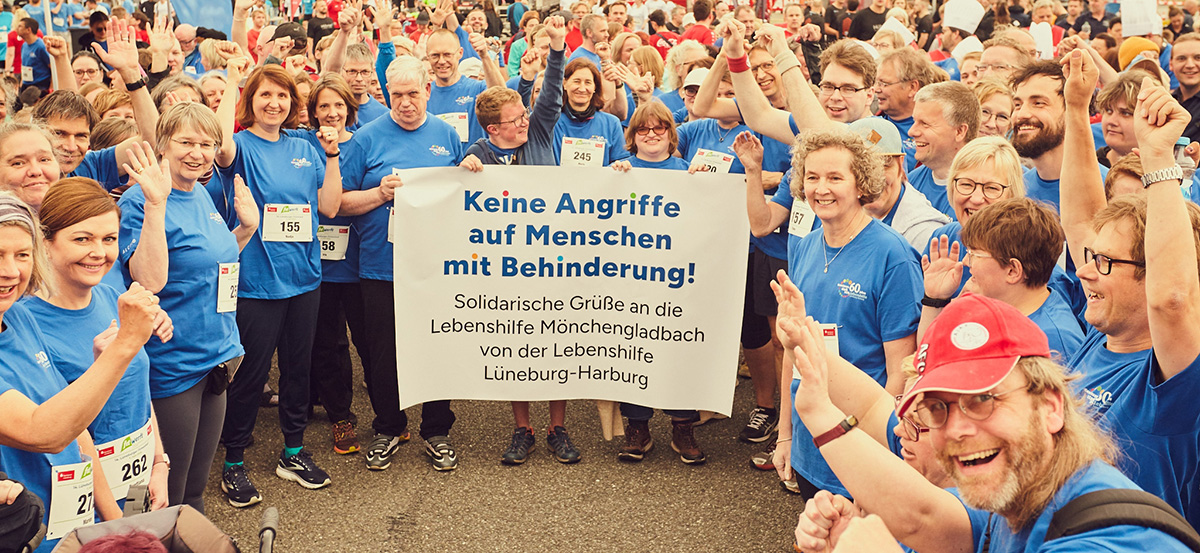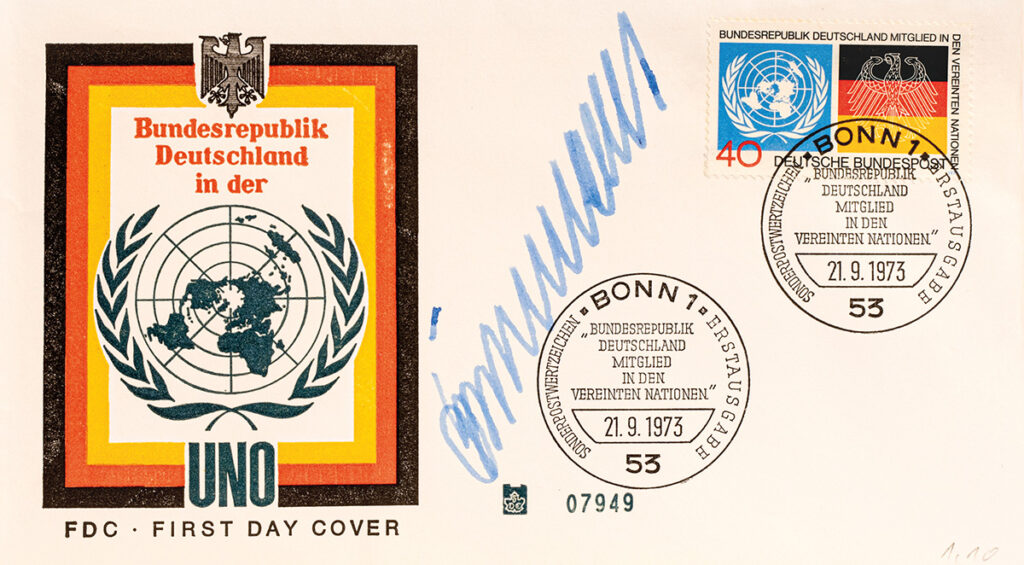NFC zu N-K-04
NEUE RECHTE
Nach 1945 kämpften Erkrankte und ihre Angehörigen jahrzehntelang für ihre rechtliche Gleichstellung und die Überwindung struktureller Gewalt. In den 1980er-Jahren entsteht eine breite Behindertenrechtsbewegung in Deutschland. 1994 erreichte die Bewegung mit einer Änderung des Artikel 3 im Grundgesetz einen ersten Erfolg. Im Mai 2002 trat das Gesetz zur Gleichstellung von Menschen mit Behinderungen in Kraft.
Bis heute sind Teilhabe und Chancengleichheit jedoch nicht überall gegeben.
Neue Rechte übernehmen das Denken aus der Zeit des Nationalsozialismus und setzen es fort. Auch Gewalt gegen Erkrankte nimmt seit Jahren wieder zu.
NEUE RECHTE
Menschen mit Behinderungen haben lange Zeit keine Rechte.
Sie werden nicht gleich behandelt.
Sie werden von der Gesellschaft ausgeschlossen.
Und sie erleben Gewalt.
Im Jahr 1980 ändert sich das.
Menschen mit Behinderungen fordern:
• gleiche Rechte für Menschen mit und ohne Behinderung.
• alle Menschen sollen gleich behandelt werden.
• Die Gewalt gegen Menschen mit Behinderung muss aufhören.
Im Jahr 1994 haben sie Erfolg:
Man ändert das Grundgesetz von Deutschland.
Das ist das wichtigste Gesetz in Deutschland.
Ab dann gilt das Grundgesetz auch
für Menschen mit Behinderungen.
Sie haben jetzt die gleichen Rechte
wie alle anderen Menschen.
Im Jahr 2002 gibt es ein neues Gesetz
in Deutschland.
In dem Gesetz steht:
Menschen mit und ohne Behinderungen sind gleich.
Aber es gibt immer noch Menschen,
die das nicht wollen.
Diese Menschen denken so, wie die Nazis früher.
Sie sind also moderne Nazis.
Sie denken:
Menschen mit Behinderungen sind nichts wert.
Es gibt immer noch Gewalt
gegen Menschen mit Behinderungen.
Man beschimpft sie oder bedroht sie.
Oder sie werden ausgegrenzt.
Aber das ist falsch.
»Nichts über uns ohne uns.«
(Motto der Behindertenrechtsbewegung)

Demonstration gegen Anschläge auf Erkrankte am 7.6.2024.
Lebenshilfe Lüneburg-Harburg. Fotograf Johannes Kruse.
Im Jahr vor Eröffnung dieser Ausstellung wurde ein rechtsextremer Anschlag auf Einrichtungen der Lebenshilfe verübt. Die Botschaft »Euthanasie ist die Lösung« wurde mit einem Stein durch ein geschlossenes Fenster geworfen. Dagegen protestierte die Gedenkstätte Lüneburg gemeinsam mit der Lebenshilfe Lüneburg-Harburg.
Im Jahr 2024 werfen Nazis einen Stein
in ein Haus von der Lebenshilfe.
An dem Stein hängt ein Zettel.
Auf dem Zettel steht:
Kranken-Mord ist die Lösung.
Die Nazis meinen damit:
Man soll Menschen mit Behinderung und Krankheiten ermorden.
Dann geht es allen Menschen in Deutschland besser.
Die Lebenshilfe Lüneburg und
die Gedenkstätte Lüneburg sagen:
Nein!
Das darf nie wieder passieren.
MENSCHENRECHTE
Am 3. Mai 2008 trat das Übereinkommen der Vereinten Nationen über die Rechte von Menschen mit Behinderungen in Kraft. Ziel ist es, die Menschenrechte und Grundfreiheiten der Menschen mit Behinderungen zu fördern, zu schützen und zu gewährleisten. Es geht um Teilhabe und Chancengleichheit. Deutschland ist seit 2009 verpflichtet, das Übereinkommen anzuwenden. Verstöße können beim Europäischen Gerichtshof für Menschenrechte angezeigt werden.
MENSCHEN-RECHTE
Viele Länder auf der Welt arbeiten zusammen.
Diese Länder nennen sich: Vereinte Nationen.
Auf Englisch heißt das: United Nations.
Darum sagt man auch kurz: UN.
Die UN hat einen wichtigen Vertrag gemacht.
In dem Vertrag geht es um die Rechte
von Menschen mit Behinderung.
Der Vertrag heißt: UN-BRK.
Das ist kurz für: UN-Behindertenrechts-Konvention.
Alle Länder von der UN müssen sich
an den Vertrag halten.
Halten sich die Ländern nicht an den Vertrag?
Dann bekommen sie eine Strafe.
In Deutschland gibt es seit dem Jahr 2009
ein Gesetz zur UN-BRK.
In dem Gesetz steht:
Menschen mit und ohne Behinderung haben
die gleichen Rechte.
Das sind die Menschen-Rechte.
Menschen mit Behinderung sollen überall dabei sein und mitmachen.
Das nennt man: Inklusion.
Es darf keine Hindernisse geben
für Menschen mit Behinderung.
Das nennt man: Barrierefreiheit.
Menschen mit Behinderung können
sich beschweren.
Zum Beispiel, wenn sie nicht mitmachen dürfen.
Sie können sich beim Europäischen Gerichtshof beschweren.
»Man erkennt den Wert einer Gesellschaft daran,
wie sie mit den Schwächsten ihrer Glieder verfährt.«
Gustav Heinemann, Bundespräsident von 1969 bis 1974.
Gustav Heinemann war vom Jahr 1969 bis 1974 Präsident von der Bundesrepublik Deutschland.
Er hat mal gesagt:
In einer Gesellschaft leben
viele verschiedene Menschen zusammen.
Einige Menschen in der Gesellschaft
brauchen Hilfe.
Zum Beispiel:
• kranke Menschen
• arme Menschen
• alte Menschen
• Menschen mit Behinderung
Eine gute Gesellschaft kümmert sich
um diese Menschen.

Briefumschlag mit Sonderpostwertzeichen »Bundesrepublik Deutschland Mitglied in den Vereinten Nationen« und Autogramm von Gustav Heinemann (1899 – 1976) als Erstausgabe, 21.9.1973.
ArEGL 172.
Das ist eine Briefmarke vom 21. September 1973.
Sie zeigt:
Deutschland gehört zur UN.
Auf der Briefmarke ist die Unterschrift
von Gustav Heinemann.
Es gibt eine Bandbreite von Menschen mit Behinderungen und Erkrankungen. Es gibt Säuglinge, die erkrankungsbedingt nur wenige Tage leben, schwer und dauerhaft psychisch Erkrankte, Alterserkrankte mit schweren Verläufen, Menschen mit hohem Unterstützungsbedarf. Alle haben ein Recht auf ein würdevolles Leben – jede Sekunde, jede Minute, jeden Tag.
Menschen sind verschieden,
aber alle Menschen sind wertvoll.
Einige Menschen haben eine Behinderung.
Auch die Behinderungen sind verschieden:
Einige Menschen haben ab der Geburt
eine Behinderung.
Andere Menschen bekommen erst später
eine Behinderung.
Zum Beispiel: durch einen Unfall.
Einige Menschen sterben sehr früh
wegen einer Behinderung.
Andere Menschen werden sehr alt
mit einer Behinderung.
Einige Menschen mit Behinderung brauchen
viel Hilfe.
Andere Menschen mit Behinderung brauchen
nur wenig Hilfe.
Alle Menschen sind verschieden,
aber alle Menschen sind wertvoll.
HUMAN RIGHTS
The United Nations Convention on the Rights of Persons with Disabilities came into force on 3 May 2008. The aim is to promote, protect and guarantee the human rights and fundamental freedoms of people with disabilities. It is about participation and equal opportunities. Germany has been obliged to apply the Convention since 2009. Violations can be reported to the European Court of Human Rights.
NEW RIGHTS
After 1945, people with disabilities and their relatives fought for decades for legal equality and to overcome structural violence. In the 1980s, a broad disability rights movement emerged in Germany. In 1994, the movement achieved its first success with an amendment to Article 3 of the Basic Law. In May 2002, the Act on the Equality of Persons with Disabilities came into force.
However, participation and equal opportunities are still not guaranteed everywhere.
New right-wingers are adopting and continuing the thinking from the National Socialist era. Violence against sick people has also been on the rise again for years.
»Nothing about us without us.«
(Motto of the disability rights movement)

Demonstration against attacks on sick people on 7 June 2024.
Lebenshilfe Lüneburg-Harburg. Photographer Johannes Kruse.
In the year before this exhibition opened, a right-wing extremist attack was carried out on facilities belonging to Lebenshilfe. The message »Euthanasia is the solution« was thrown through a closed window with a stone. The Lüneburg Memorial protested against this together with Lebenshilfe Lüneburg-Harburg.
»You can recognise the value of a company by this,
how it treats the weakest of its members«.
Gustav Heinemann, Federal President from 1969 to 1974.

Envelope with special postage stamp »Federal Republic of Germany Member of the United Nations« and autograph of Gustav Heinemann (1899–1976) as first edition, 21 September 1973.
ArEGL 172.
There is a wide range of people with disabilities and illnesses. There are babies who only live for a few days due to illness, people with severe and long-term mental illness, elderly people with severe illnesses and people with high support needs. They all have a right to a dignified life – every second, every minute, every day.
PRAWA CZŁOWIEKA
Konwencja Narodów Zjednoczonych o prawach osób niepełnosprawnych weszła w życie 3 maja 2008 roku. Jej celem jest promowanie, ochrona i zagwarantowanie praw człowieka i podstawowych wolności osób niepełnosprawnych. Konwencja dotyczy uczestnictwa i równych szans. Niemcy są zobowiązane do stosowania Konwencji od 2009 roku. Naruszenia mogą być zgłaszane do Europejskiego Trybunału Praw Człowieka.
NOWE PRAWA
Po 1945 roku osoby niepełnosprawne i ich rodziny przez dziesięciolecia walczyły o równość prawną i przezwyciężenie przemocy strukturalnej. W latach 80. w Niemczech pojawił się szeroki ruch na rzecz praw osób niepełnosprawnych. W 1994 r. ruch ten odniósł swój pierwszy sukces, wprowadzając poprawkę do art. 3 Ustawy Zasadniczej. W maju 2002 r. weszła w życie ustawa o równości osób niepełnosprawnych.
Jednak uczestnictwo i równe szanse wciąż nie wszędzie są gwarantowane.
Nowi prawicowcy przejmują myślenie z czasów narodowego socjalizmu i utrwalają je. Od lat wzrasta również przemoc wobec osób chorych.
»Nic o nas bez nas.«
(Motto ruchu na rzecz praw osób niepełnosprawnych)

Demonstracja przeciwko atakom na osoby chore 7 czerwca 2024 r.
Lebenshilfe Lüneburg-Harburg. Fotograf Johannes Kruse.
W roku poprzedzającym otwarcie tej wystawy doszło do ataku skrajnej prawicy na placówki organizacji Lebenshilfe. Przez zamknięte okno wrzucono kamień z napisem »Eutanazja jest rozwiązaniem«. Przeciwko temu protestowało miejsce pamięci w Lüneburgu wraz z organizacją Lebenshilfe Lüneburg-Harburg.
»Wartość społeczeństwa można rozpoznać po sposobie, w jaki traktuje ono swoich najsłabszych członków:«
Gustav Heinemann, prezydent federalny w latach 1969-1974.

Koperta ze specjalnym znaczkiem pocztowym »Republika Federalna Niemiec członkiem Organizacji Narodów Zjednoczonych« i autografem Gustava Heinemanna (1899–1976) jako pierwsze wydanie, 21.09.1973 r.
ArEGL 172.
Istnieje szerokie spektrum osób niepełnosprawnych i chorych. Są niemowlęta, które z powodu choroby żyją tylko kilka dni, osoby z ciężkimi i trwałymi zaburzeniami psychicznymi, osoby starsze cierpiące na poważne schorzenia, osoby wymagające intensywnej opieki. Wszyscy oni mają prawo do godnego życia – każdej sekundy, każdej minuty, każdego dnia.

